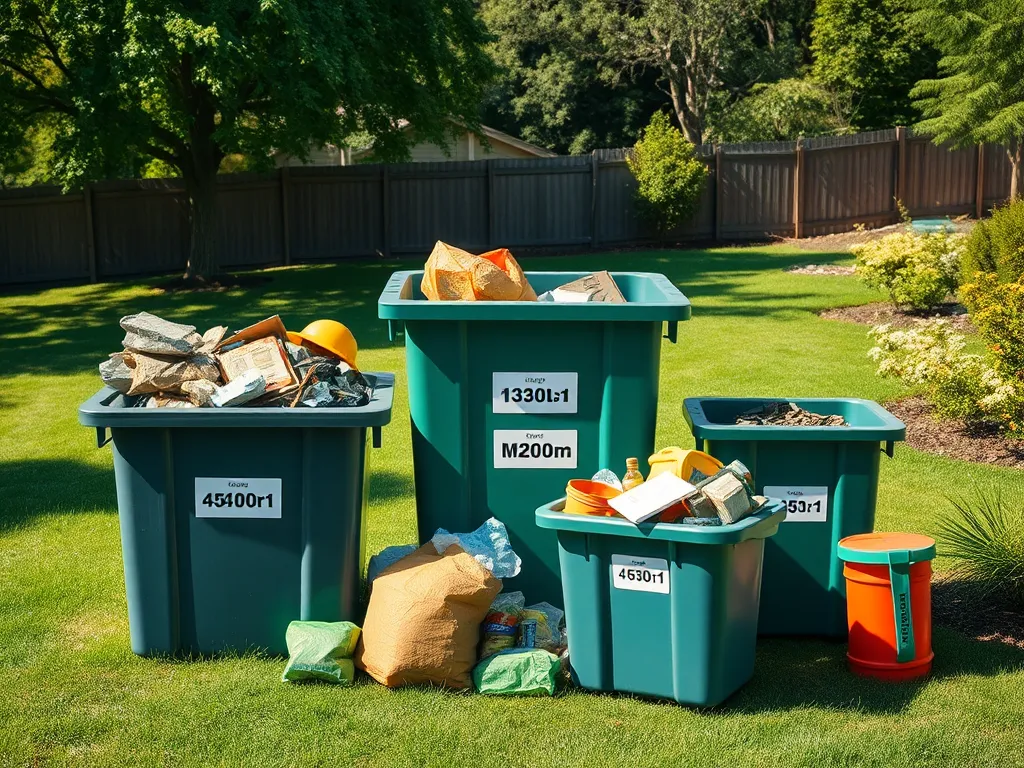Your Guide to Choosing the Right Dumpster Size

Choosing Dumpster Size: A Comprehensive Guide
Choosing dumpster size can be a daunting task, especially for those who may not know the different types and sizes available for their specific waste disposal needs. Whether you're undertaking a home renovation, cleaning out your garage, or managing a large construction project, understanding the right dumpster size is crucial to ensure a smooth and efficient waste disposal process. It can save you time, hassle, and even extra costs associated with a dumpster that is either too small or too large for your requirements.
When it comes to Choosing dumpster size, it's essential to consider several factors that can influence your decision. These include the type of waste you're disposing of, the duration of your rental, and the total volume of waste you expect to generate throughout the project. Each of these elements plays a critical role in determining the most appropriate dumpster size for your needs. Proper evaluation of these factors can lead to a more effective and economical waste management solution.
Choosing the right waste container can be challenging, so read this guide on How to Estimate the Right Dumpster Size for Your Construction Site to simplify the process.
Additionally, in the process of Choosing dumpster size, it's important to be aware of common dumpster sizes available on the market. Different projects typically require varying dumpster capacities, ranging from small ones for minor cleanouts to larger ones for significant renovations or construction work. Being informed about these standard sizes helps you to select a dumpster that will adequately accommodate your waste without causing additional problems like overflow or overcapacity.
Moreover, accurate estimation of your waste volume is key when Choosing dumpster size. This involves considering the project scope, the anticipated waste types, and even consulting with professionals when in doubt. Understanding the implications of dumpster size on project costs and adhering to local regulations can further streamline the waste disposal process. All these considerations ensure that you opt for the most suitable dumpster for your particular situation.
Finally, understanding the cost implications of different dumpster sizes when Choosing dumpster size can save you from unexpected expenses. Different sizes come with varying rental costs, and you must factor in any extra fees that might arise from overweight loads. By weighing the costs relative to your project budget, you can make a more informed decision about which dumpster will best suit your needs without breaking the bank.
Factors Influencing Dumpster Size
One of the main factors influencing dumpster size is the type of project you're undertaking and the waste types that will be generated. For instance, a residential cleanout will produce different waste materials than a demolition site. Construction debris, yard waste, or household junk all require different dumpster sizes to accommodate the specific types of materials being disposed of.
The duration of the rental period is another factor affecting dumpster size. If your project is ongoing and might last several weeks, you may need a larger dumpster that can hold more waste over time. On the other hand, a one-time cleanout may only require a smaller, short-term rental, making it essential to assess the timeframe your project entails.
Volume of waste expected is crucial when Choosing dumpster size. Accurately estimating how much waste you expect to produce can help you select a dumpster that's neither too big nor too small. Overestimating can lead to unnecessary costs, while underestimating might result in overflows and additional fees.
Weight limitations and restrictions should not be overlooked either. Dumpsters come with weight limits, and exceeding these limits can incur extra costs or necessitate the need for an additional dumpster rental. When Choosing dumpster size, make sure to be aware of how heavy your waste materials will be.
Common Dumpster Sizes
10-yard dumpsters are typically suited for small projects such as minor remodeling, garage cleanouts, or yard waste disposal. They can hold approximately three pickup truck loads of debris, making them perfect for residential cleanouts or small renovation tasks.
20-yard dumpsters are ideal for medium-sized renovations or large cleanouts. They can accommodate larger volumes of waste, making them great for kitchen or bathroom remodels, as well as for managing debris from roofing or siding projects. Expect to dispose of about six pickup truck loads of waste with this size.
For larger construction jobs or significant home renovations, 30-yard dumpsters are commonly used. These dumpsters are perfect for projects where substantial quantities of materials will be thrown away, like during major home remodels or new home constructions. They usually hold about nine pickup truck loads of waste.
40-yard dumpsters are designed for major cleanouts or significant commercial projects. These are the largest size available and can handle massive volumes of waste, including construction debris, large quantities of mixed waste, or major estate cleanouts, equating to about twelve pickup truck loads.
Tips for Accurately Estimating Waste
To accurately estimate the waste your project will generate, assess your project needs based on square footage. Knowing the dimensions of the area you're working on can give you a better idea of the amount of debris that will need disposal.
Consulting with professionals who are experienced in similar projects can also provide valuable insights on estimating waste volume. Their expertise can help ensure that you make the right choice when selecting a dumpster size.
Considering local regulations and landfill restrictions is another step in accurately estimating waste. Some areas have specific guidelines regarding what can and cannot be disposed of in a dumpster, which may also impact the size and type of dumpster you require.
Utilizing waste calculators can help in providing precise estimations. Many online tools are designed to help you calculate your expected waste volume based on the type of materials and the scope of your project, aiding in Choosing dumpster size more effectively.
Cost Implications of Dumpster Sizes
Understanding rental costs per size is vital in determining your budget. Typically, larger dumpsters will come with higher rental costs, but they provide the advantage of accommodating more waste at once, potentially saving time and effort.
Extra fees for overweight loads can lead to unexpected expenses. Each dumpster rental service has specific weight limits, and exceeding those can incur additional charges, making it essential to consider the weight of your waste materials when Choosing dumpster size.
The impact of size on project budget cannot be underestimated. Opting for a dumpster that fits your needs not only helps in avoiding additional fees but also ensures that your project runs smoothly without delays caused by waste disposal issues.
By comparing costs between sizes, you can find a suitable balance between your budget and size requirements. Often, it may be more economical in the long run to choose a slightly larger dumpster than to rent multiple smaller ones.
When to Rent a Dumpster
Renting a dumpster is typically required for debris removal during home renovations. These projects often generate more waste than regular trash pickups can handle, thus necessitating a dedicated solution for waste disposal.
Cleaning out garages and basements is another occasion when renting a dumpster is beneficial. Whether clearing clutter or disposing of old furniture, having a dumpster can significantly simplify the removal of bulk items.
Handling landscaping projects may also require renting a dumpster, especially when dealing with large amounts of dirt, plant debris, and yard waste that need to be disposed of efficiently.
For commercial jobs, special considerations should be made regarding waste disposal needs. Depending on the scale and nature of the project, businesses often require larger dumpsters and more frequent pickups to comply with waste management regulations and ensure a tidy worksite.
